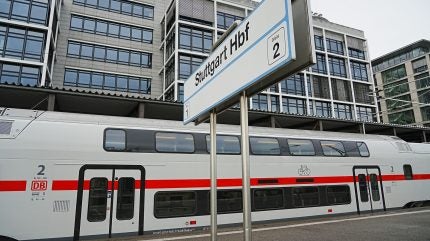
It’s been 29 years since the city of Stuttgart, Germany, announced it would renew its ageing rail station, but instead of a shiny new terminal, Deutsche Bahn (DB) has introduced another delay to the S21 project.
The idea pitched and agreed to in 1995 was intended to give the southwestern city and capital of Baden-Württemberg a new beginning at the start of the 21st century. Construction only began in 2010.

Discover B2B Marketing That Performs
Combine business intelligence and editorial excellence to reach engaged professionals across 36 leading media platforms.
Deutsche Bahn has now revealed the new central station won’t open until at least December 2026, but even then it will not be fully complete.
DB and the S21 steering committee agreed on the new timetable, which outlined what the organisations will hope is the final chapter in the embarrassing saga.
“From the end of 2025, all systems will gradually go into test operation. The future main station will open in December 2026. According to the current status, all essential elements of the project should then be available – with the exception of the Gäubahn connection via the airport,” the plan set out.
The new “long-distance” station at Stuttgart Airport will also open in 2026, but another link via the airport to the southern Gäubahn line will not even begin construction before 2026. However, even the 2032 completion date is not guaranteed. DB explained it will depend on federal budgets for 2025/26.

US Tariffs are shifting - will you react or anticipate?
Don’t let policy changes catch you off guard. Stay proactive with real-time data and expert analysis.
By GlobalData“Stuttgart 21 is the most complex commissioning of a new railway hub in Europe in recent decades,” said Berthold Huber, a member of DB’s Infrastructure Board.
The original commissioning of the new hub, which would directly connect Stuttgart’s airport with the city centre and Ulm, another of the region’s large towns, set the programme’s budget at €4.1 billion ($4.8 billion). By 2016 that had risen to €6.3bn ($6.8bn), and is now estimated to be at least €11.45bn ($12.36bn).
On top of construction costs, which a court recently ruled was to be paid by DB rather than its project partners (which successfully argued its contracts were for a fixed sum), DB is also now responsible for the partners’ court costs.
The project delay is reminiscent of the HS2 soap opera in the UK, or Germany’s own long-winded process of developing Berlin’s new BER airport. Along with escalating costs and construction delays, there have been planning difficulties and local protests against the S21 site.
Environmental concerns are rightly at the centre of most modern megaprojects, and protestors raised the potential impact on the underground water table in the Stuttgart valley. This led to a new groundwater management system being installed under the expanded station. But such significant problems, and their expensive solutions, meant DB itself regretted undertaking the project.
“[If we had] the knowledge we have today, we would not have begun the project, but we would still continue it,” a leaked 2017 document explained.
“With the modern, digitalized hub in the southwest of the country, we will be able to offer significantly more and many faster connections. Stuttgart 21 must work right from the start – with stable timetables that passengers can rely on,” Huber added.
He explained the new delay was implemented to ensure an (eventual) smooth transition: “To achieve this, we will intensively test all new components of the rail infrastructure, the future station, the Stuttgart Digital Hub and also the vehicles and carefully prepare the operating staff for this.”





